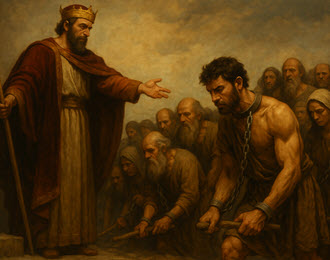No king like all the nations (2)
14-07-2025 - Posted by Geert-JanOriginally posted on June 03, 2025 – by Andre Piet
power corrupts – and the people want it that way
In 1 Samuel 8, the people of Israel make a remarkable request: they want a king, like the other nations have. No more temporary judgeship, but a fixed institution, a throne, a hereditary succession. Someone who will lead them, protect them, govern them. At first glance a reasonable desire. But according to God Himself, it is a rejection of Him.
What follows is a prophetic lesson about power, freedom, and dependence. And strikingly: the critique is not aimed solely at the king, but especially at the people who choose him themselves. It is not a coup. Not foreign domination. Israel chooses the leader who will ultimately make them slaves.
a king who takes
The central warning Samuel gives is built around one verb: to take. Six times he mentions it explicitly. The king will take:
- Your sons for his army and service (8:11,12).
- Your daughters for his court staff (8:13).
- Your fields, vineyards, and olive groves (8:14).
- Your yield of grain and livestock (8:15).
- Your servants, young men, and working animals (8:16).
- And finally: you yourselves (8:17).
It is a pattern: the more power, the more the king appropriates. What begins as protection ends in seizure. Not by a hostile power, but by the very institution they themselves establish.
why does a people ask for this?
The core question is: why does the people ask for this themselves? God says to Samuel: “It is not you they have rejected, but Me.” That is God’s diagnosis. The people want certainty — but without faith. Security, without dependence on God.
Their words reveal it: “Our king will go out before us and fight our battles” (verse 20). They seek protection against external threats, but want to secure that guarantee in a system. No life based on trust in GOD, but on power and control.
democracy leads to slavery
What makes 1 Samuel 8 all the more piercing is that this choice comes from below. It is not God who imposes a king. It is the people themselves who choose it. And that makes the comparison to modern democracies painfully relevant.
In a democracy, the people choose their leaders. In theory, that keeps leaders in check, but in practice it inevitably leads to something else: the people increasingly demand guarantees. More care, more protection, more direction. And that automatically entails more power. More taxation. More regulation. More centralization.
It seems voluntary — after all, it comes about by voting. But the choice is based on fear. On a desire for “existential security,” apart from faith. Democracy is the mechanism by which the people give up their freedom themselves.
In 1 Samuel 8, this is precisely what happens. Not: the king grabs power. But: the people ask him for it. And Samuel says: “If you go down this path, this is what will happen.” Not a warning about what might happen — but a description of an inevitable process. Power grows. Always.
care is not free
What a king gives, he first has taken. The benefits, the protection, the governance — it all comes from the labor of the people themselves. First sons and daughters are claimed. Then land and yield. And finally they themselves.
This is the price of the ‘guarantees’: the human is no longer free. Food, education, and healthcare are promised. The institution is to guarantee it. But everything is imposed. Whoever receives everything becomes dependent and ultimately owns nothing. Or as the chairman of the World Economic Forum put it: You’ll own nothing. And you’ll be happy. Everything arranged. Everything centralized. But nothing is yours anymore.
the quiet exchange: freedom for security
The lesson from 1 Samuel 8 is confronting: the desire for security blinds people to what it costs. The people wanted safety, stability, order. They got bureaucracy, levies, dependence. They wanted a king — and became property themselves.
God’s objection was not so much about the form, but the motive. Not the kingship itself, but the desire for an institution that offers guarantees — apart from trust in Him. With that, the people chose slavery in exchange for security. What they asked for, they received. But the price was freedom.
This article is an adaptation of this address.

 English Blog
English Blog